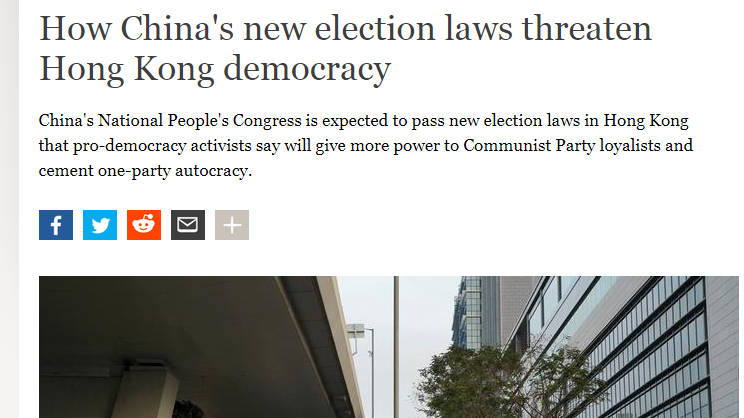
A screenshot of a Deutsche Welle report on Hong Kong SAR.
A screenshot of a Deutsche Welle report on Hong Kong SAR.
Editor's note: Alessandro Golombiewski Teixeira is a National Thousand Talent Distinguished Professor of Public Policy at the School of Public Policy and Management, Tsinghua University, and a professor of International Business at Schwarzman College in Tsinghua. He is a former special economic adviser to the president of Brazil and former minister of tourism, and minister of development, industry and foreign trade of Brazil. He was also president of the World Investment Association – WAIPA. The article reflects the author's views, not necessarily those of CGTN.
Foreign media reporting on China has an overwhelming negative tint. Whether distorted, prejudiced or even distrusting of basic information and data, unfavorable views on China have soared since just a year ago, according to a Pew Research Center Survey.
One of the primary reasons can be attributed, in my opinion, to China's development success and its emergence as a leading economic power.
China has defied the global pandemic to be the only economy to grow in 2020, alongside leaps forward in development of economic growth, education literacy and poverty elimination. European and American media cannot help but to impose a sense of skepticism on a country whose market power and influence are perceived as undermining their own.
With this in mind, it is easy to conclude when researching online and offline media publications that many China-related issues have been repeatedly prejudiced.
To dive deeper into how a particular matter is interpreted and reported across various media outlets, let's take the case of this week's Hong Kong electoral improvements. The main news outlets in Europe and the U.S. have offered superficial, inaccurate and distorting accounts of the objective of these proposed improvements. For example, the BBC has released an article titled "China approves 'patriotic' plan to control elections," Reuters has called China's electoral improves an "earthquake" set to upend Hong Kong, U.S. News reported an "Attack on Political Rights: China Cracks Down on Hong Kong's Electoral System," and lastly, German state-owned international broadcaster Deutsche Welle report was headlined, "How China's new elections laws threaten Hong Kong democracy."
I want to believe that the international media's criticism of China is not China hating, but plain sensationalism, misconception and envy of the influence that China is exerting throughout the world.
As a former politician in Latin American, I have learned that multinational media groups (Media Imperialism Theory) use a broad and misleading concept of Western democracy to condemn different political systems if such attacks are aligned with their economic interest.
A good example is my own country, Brazil, where news outlets manipulate information, create fake news and pressure the government and legal institutions. This led to an innocent president being jailed for over three years, all because he did not conform with international interests. Eventually, this injustice was undone. But still the threat of this repeating itself remains.

A screenshot of a BBC report on Hong Kong SAR.
A screenshot of a BBC report on Hong Kong SAR.
The case of electoral improvements in Hong Kong is a particularly stark example of media prejudice. International media failed to report how the various political forces in Hong Kong have used elections as a means to enter the political system and attempt to paralyze the Legislative Council's operations. Similarly, the deliberate obstruction in government activities supported by international organizations (evidence proves the Hong Kong protests were financed in part or fully by international organizations) also happened to be absent from articles. These actions have seriously damaged the constitutional order and rule of law in Hong Kong, endangering national sovereignty, security, and development interests, and, at the end blaming China.
The improvements Hong Kong will carry out are based on several important ideas:
To guarantee the implementation of the "One Country, Two Systems" principle; ensure "Hong Kong people ruling Hong Kong" with patriots as the main constituting body; to establish an Election Committee that is broadly representative and reflects the overall interests of society; the chief executive of the Hong Kong Special Administrative Region shall be elected by the Election Committee and appointed by the central government.
It is clear that there are no "attacks on political rights" or "threatening of Hong Kong democracy." European and U.S. media groups have once again constructed a narrative implying that the improvements would limit the ability of Hong Kong people to select their representatives. In fact, the improvements serve to ensure the people's representative are patriots – "Hong Kong citizens that love and have commitment to their country" – instead of being aligned with international interests and in turn damaging Hong Kong's own political and economic interests.
Instead of constructing one-sided reports that promote a negative attitude towards China, international media should focus on objective reporting that approaches issues through the lens of both Western nations and China. We, as readers, also have to be aware of the flaws of sensationalist media that often serve the news outlets' own agenda, whether financially or politically motivated. Only by keeping this in mind can we fully understand the dynamics of contested global issues, such as Hong Kong's politics.
(If you want to contribute and have specific expertise, please contact us at opinions@cgtn.com.)

